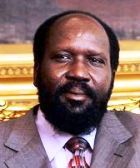US, Sudanese VP discuss Darfur peacemaking
Nov 11, 2005 (JUBA) — A senior U.S. envoy and Sudan’s vice president discussed their efforts to bring peace to troubled Darfur Friday.
 Salva Kiir Mayardit, a former southern rebel leader, told U.S. Deputy Secretary of State Robert Zoellick he met Thursday in neighboring Kenya with leaders of the main Darfur rebel group, the Sudan Liberation Movement. Kiir said he told them that their internal power struggles were complicating power and wealth-sharing talks with the government. The talks are set to resume Nov. 20 in Nigeria.
Salva Kiir Mayardit, a former southern rebel leader, told U.S. Deputy Secretary of State Robert Zoellick he met Thursday in neighboring Kenya with leaders of the main Darfur rebel group, the Sudan Liberation Movement. Kiir said he told them that their internal power struggles were complicating power and wealth-sharing talks with the government. The talks are set to resume Nov. 20 in Nigeria.
Zoellick had delivered the same message earlier this week to Sudan Liberation Movement leaders. Zoellick also has expressed concern disputes among the rebels had sparked more violence, contributing to deteriorating security in the western region of Darfur.
Kiir’s southern organization laid down its arms after 21 years under a January agreement some see as a model for resolving the Darfur conflict. Kiir’s organization is believed to have influence over the Darfur rebels, though the conflicts were not related.
Zoellick said Friday that he had sent two senior U.S. diplomats to meet with Minni Minnawi, a faction leader of the Sudan Liberation Movement, and press him to attend the next session of peace talks and not think that he can resolve the conflict militarily.
Friday, the U.S. moved to cement ties with the autonomous government of southern Sudan by opening a consulate in the south.
The consulate, the only one any country was operating in the southern capital of Juba, was to be housed for the time being in a Red Cross compound. Zoellick raised the U.S. flag there Friday.
Zoellick is in Sudan to try to shore up the implementation of the southern peace deal and strengthen efforts to end separate conflicts in Darfur and in eastern Sudan.
The January peace agreement provided for a unity government of northerners, most of whom are Muslim and of Arab descent, and southerners, most of whom are Christian or animist and of African descent. The agreement also provided for an autonomous south with its own army, government and a new constitution during a six-year interim period. After the transition, the 10 southern states will hold a referendum on independence.
Implementation of the deal faltered after the death of the southern leader John Garang in a helicopter crash in July. Among the key provisions whose implementation has been delayed were steps to ensure oil revenues are equitably shared.
Concerns the north-south peace could fray added to uncertainty and instability amid the conflict in Darfur, scene of one of the worst humanitarian crises in the world.
The U.N. estimates that 180,000 people have died, mainly through famine and disease in Darfur. No firm figures exist on the number killed in fighting. Several million more have either fled into neighboring Chad or been displaced inside Sudan. Most of those who fled now live in sprawling camps, kept alive by food and medical care provided by aid workers.
After decades of clashes over land and water in Darfur that often pitted the region’s ethnic Arab tribes against its ethnic African tribes, conflict erupted on a wider scale in February 2003. Then, the Sudan Liberation Movement and the other major rebel group, the Justice and Equality Movement, took up arms against the Sudanese government amid accusations of repression and unfair distribution of wealth.
Sudan’s Arab-dominated central government is accused of responding by backing ethnic Arab militia known as Janjaweed who have carried out rapes and killings against Sudanese of African origin. The government denies backing the Janjaweed.
